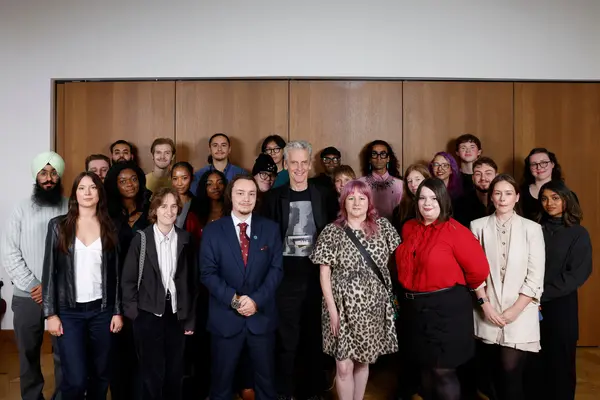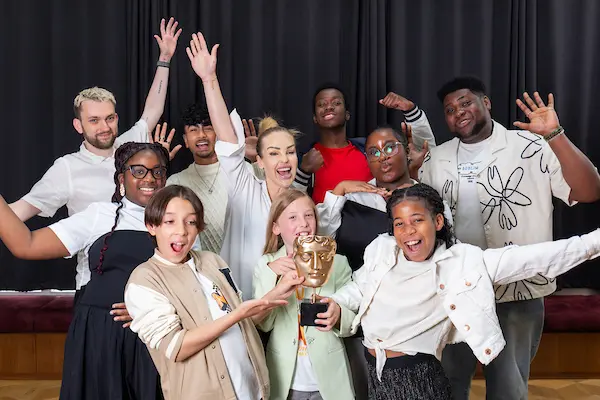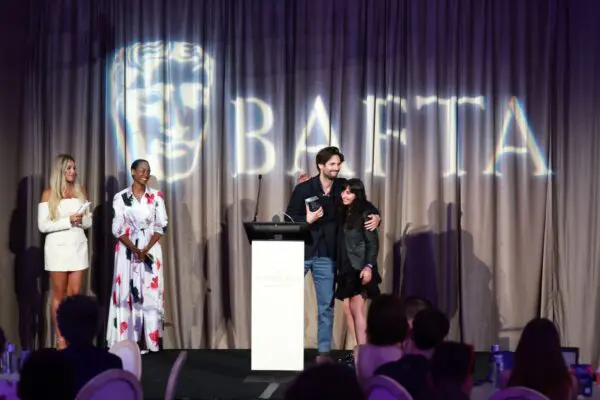Yesterday evening, the British Academy of Film and Television Arts (BAFTA) hosted Lennie James for an online masterclass on his career and craft of acting, screenwriting and directing. BAFTA Masterclass: Lennie James is part of BAFTAs year-round free online events series, featuring BAFTA-winning and nominated shows and talent, open to members of the public and industry.
Key quotes from the Masterclass are available below, including on Lennie’s decision to choose Guildhall School of Music and Drama because it felt more inclusive and not wanting to be typecast; his move to America and how this reinvigorated him; his recent directorial-debut in The Walking Dead; how the Coronavirus has brought us together as a community; and the stories he still has to tell, including a period drama.
If using any of this material, please credit BAFTA. Tickets for upcoming events are available here: events.bafta.org
Recordings of previous events are available on BAFTA Guru, BAFTA’s online learning channel: www.bafta.org/guru
Key quotes from the masterclass are available below, with the speakers labelled as follows:
BAFTA Masterclass: Lennie James
Date: Wednesday 11 November
Lennie James (LJ) in conversation with Boyd Hilton (BH)
Speaking about why he chose Guildhall School of Music and Drama over RADA and not being the ‘token’ black actor, Lennie said:
LJ: “When I auditioned for drama school I auditioned for Central, RADA and The Guildhall and I got into RADA and The Guildhall and I felt whether—I don’t know rightly or wrongly though I do kind of know—that when I didn’t go to RADA that they gave my place to another black actor but when I was offered a place at Guildhall they offered places to three other black people, two guys and one girl, and that influenced my choice really and I didn’t want to be the token, for want of a better phrase. I have to give Guildhall credit that back in ’85 it wasn’t great diversity but it was more diverse than most.”
BH: “it’s very interesting when you talk about making the right decision and turning down certain roles. Was that as important to you, turning down the wrong things for you as finding the right things for you?”
LJ: “As a black actor you are immediately, whether you like it or not, in a political environment and you are—you have to become a political being, whether you focus on it or you don’t focus on it you have to navigate it. One way in which you navigate it is by saying there are certain roles, certain types of roles because we are so easily stereotyped that I am not going to do. And I did that. I think it’s part of the reason I’ve stayed with my agent for a long time is it took me a long time to train her up to know things I would do and wouldn’t do, and I don’t want to have to start all over again with that. So yeah, it wasn’t always—it wasn’t as kind of clear cut as it was about ambition and getting to be a leading actor, I wasn’t thinking in those terms at that particular time, I just didn’t want to play muggers if all that was going on about that part was that it was a mugger. I didn’t want to play pimps if the only thing that distinguished that character from any other character was that it was the black pimp. I didn’t want to play any parts where the only way it was described was that it was the black fill in the gap. Luckily I had options, so there wasn’t lots of periods where I was choosing between working and not working, there were situations where I was picking between jobs and when I had those options I tried to pick the choice I could live with.”
Speaking about his move to America and a clean-slate, Lennie said:
BH: “Was the decision to go to America a conscious big decision for you, or was it just something that kind of ended up making sense and there were opportunities out there and you tried it and it worked and you stayed for a while?”
LJ: “I had the opportunity to go to America a number of times before over the ten years before I went. To be honest I was working well and often in the UK, didn’t really see the need to leave. My ambition at that particular point was in the UK, I had young kids and wanted them to grow up in London, I wanted them to be Londoners and America particularly LA and Hollywood if I’m honest scared me. It all seemed a bit big. It all seemed a bit grand. All I really knew of it was ghost stories or fantastical stories and all that. I was living in ignorance of the place. Ultimately in the end two things happened: Buried on one level and the period of unemployment that followed and also I had a really bad accident and damaged my knee greatly and was out of action for most of the year really trying to rebuild my leg and learn how to walk again and suddenly realised you know how precarious the life of an actor was in the UK and I just needed to open up the horizons. So I took the opportunity of going to America with a film that I did. When it premiered in America, a film called Sahara, from then on it was pretty conventional.”
“I have to say that one of the things I most enjoyed about coming to America was it was a clean slate. They kind of knew me from Snatch, they kind of knew me from 24 Hour Party People, but outside of that they had no idea who I was. I went when I was forty, forty-one or whatever I was, and I dropped in front of them fully formed and alright at my job. I just went at it. I’d never told so many lies in my life as when I first arrived in LA. If I was going up for a part to play a soldier I told them all I was a soldier. What were they going to do, call me a liar? They didn’t know me! I relished it and took it as a way of reinvigorating myself and challenging myself all over again.”
Speaking about his recent directorial-debut on an episode of The Walking Dead, Lennie said:
LJ: “Directing in a certain sense is a bit like going to America. In that people have been asking me are you interested in being a director for years, easily fifteen nearly twenty years people have been asking me either are you interested in being a director. […] It’s something that’s been bubbling around and I’ve been putting it aside, again partly out of fear, partly out of ignorance. We were in between seasons of, we’d just come out of the second season of Save Me and I was going back to the show and I knew I was clear and all I was doing was focusing on the show and didn’t have an outstanding writing project at the time, so I took the show runners up on their offer of if you fancy directing an episode (of The Walking Dead) at any point we would be open to that. I said at the beginning of the season I’d like to take you up on it and they gave me the second episode. They didn’t even wait around and give me any time to ease myself into it, they went bang here it is. I’m really glad I did it. I don’t know entirely what I’ve learned from it, I know I want to do it again, that I probably should do it again on this show just because of the environment and figuring out what I learned and what I didn’t learn and what more I need to know, but it is something I enjoyed and will probably do again.”
Speaking to what we have learnt from the coronavirus, coming together as a community and how it has affected his projects, Lennie said:
LJ: “As far as Corona is concerned, the thing I’ve taken most away from it as I think a number of us have is just how connected we all are. This incident was happening in every single country across the world and we were all experiencing it at the same time and we were affected by it at the same time and infected by it at the same time. It was just about how connected we are. We don’t stand on our own islands, we are one and we should use that going forward. I hope the stories my industry takes on board and the way my industry gets its job done—when we went back filming, we’re back filming now on Fear the Walking Dead, one of the things I said on the first day of filming is we are community. Wearing a mask is an act of community—I do it to protect you. I don’t do it to protect me. we have to remember as a world that we are a community.”
BH: Save Me 3, is that a goer? Have you got another in your head?
LJ: The kind of lockdown and shutdown has had an effect of not being incredibly creative for me and also changing the dynamics of how we can do a season three, but season three is still something we’re thinking about, working on and trying to navigate.
Revealing more about stories he would like to tell in the future, Lennie said:
BH: Is there a part that you would love to play or a story that you would love to write?
LJ: At some point when I get old enough I’d like to play Lear. I’d quite like to do that. Are there stories I’d like to tell? Yeah there are. I mean there’s—I’d like to do my version of a period drama populated by a more realistic sense of what people, certainly in London, might have looked like in times gone by. Not by way of making an overt political statement, but by way of trying to tell the truth of the situation and finding a story that enables that. That’s one of the things I’m working on. There’s a boxing story that I’ve got in my head that I just can’t shake that I want to tell. I’m lucky in that sense that the stories I want to tell I want the possibilities of being able to tell them, it’s just a matter of time really. As for parts that I want to play, I’m open to whatever’s on offer really. if it’s a part that’s gone before, there are a couple of classic roles that I’d like to test myself against.
Ends
A full transcript of the event is available at www.bafta.org/media-centre/transcripts
Photography is available at www.bafta.thirdlight.com
For more information, please contact:
Sophie Dudhill, Press Officer, BAFTA
T 020 7292 5863
E [email protected]









